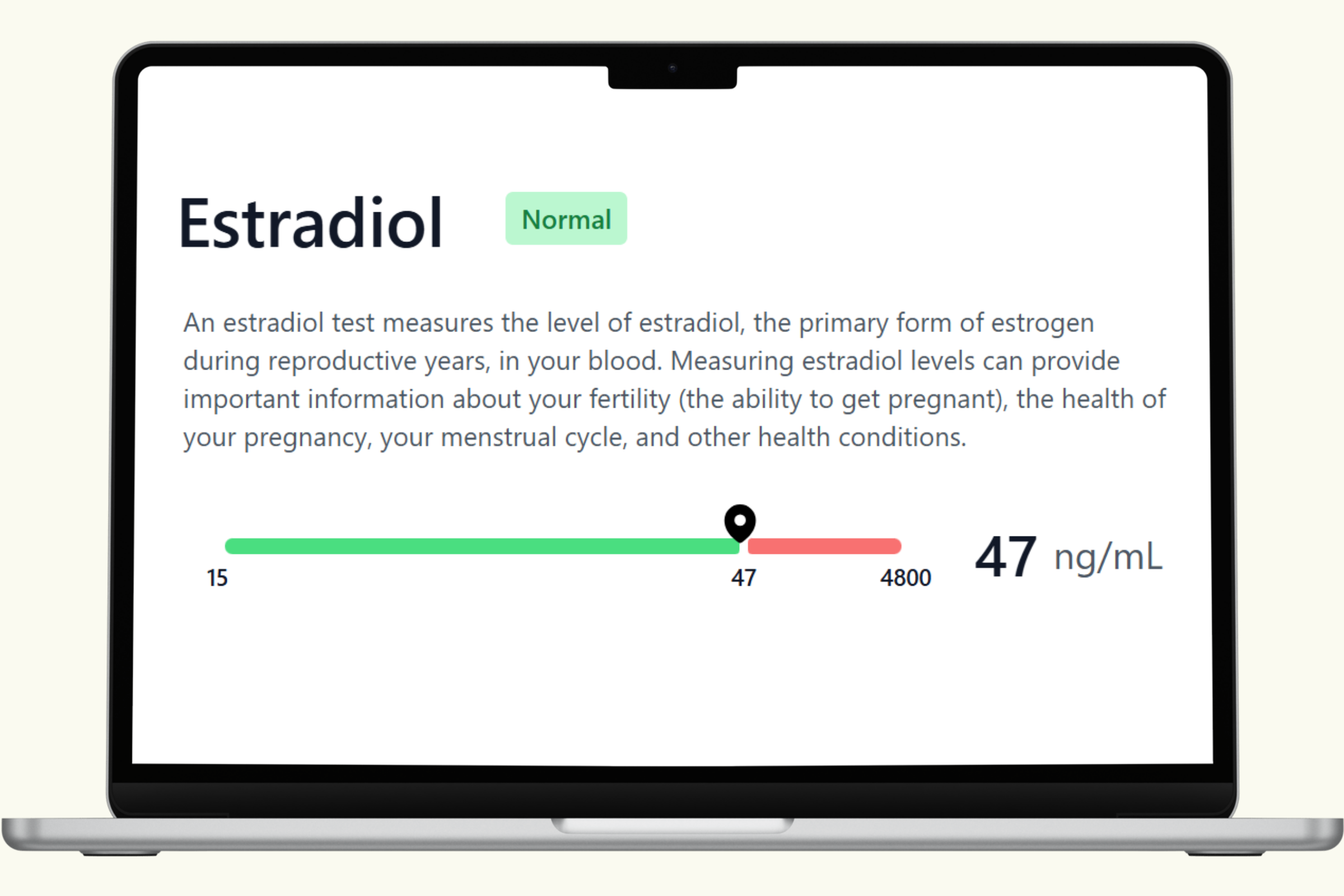Estradiol (E2) Blood Test: An Essential Marker for Men’s Health
When most people think of estrogen, they immediately associate it with women’s health. However, men also produce and rely on estrogen—particularly estradiol (E2), the most biologically active form of the hormone. Though it is present in much smaller amounts than testosterone, estradiol plays a vital role in male physiology, influencing reproductive health, brain function, bone strength, cardiovascular balance, and even body composition.
The PlexusDx Men’s Health & Wellness Blood Test includes measurement of estradiol using a simple at-home dried blood spot collection with an ADX card. This convenient method allows you to understand your hormone balance without the need for a traditional blood draw.
What is Estradiol (E2)?
Estradiol is one of three major estrogens (estrone, estriol, and estradiol), but it is the most potent and active form in men and women. In men, estradiol is primarily produced in the testes, where testosterone is converted into estradiol by the enzyme aromatase. Smaller amounts are produced in the brain, fat tissue, bones, and immune cells.
Although estrogen is often thought of as a “female hormone,” men rely on estradiol for essential health functions. In fact, both too little and too much estradiol can negatively impact male health.
Why Estradiol Matters for Men
1. Reproductive Health & Libido
Estradiol helps regulate the hypothalamic-pituitary-gonadal axis, which controls testosterone production and sperm development. Low estradiol may contribute to reduced libido, erectile dysfunction, and infertility. Conversely, elevated estradiol levels can suppress testosterone and lead to imbalances that impair fertility.
2. Brain & Cognitive Function
Estradiol is neuroprotective—it supports neurotransmitter signaling, memory formation, and mood regulation. Optimal estradiol levels in men are linked to sharper cognition and improved emotional well-being, while imbalances may contribute to mood swings, anxiety, or brain fog.
3. Bone Health & Strength
Estradiol is critical for maintaining bone density. Men with low estradiol levels have a higher risk of osteoporosis and fractures, even if their testosterone levels are normal. Adequate estradiol is therefore a cornerstone of long-term skeletal strength.
4. Weight Balance & Body Composition
Estradiol helps regulate fat distribution and metabolism. Both very low and very high levels can affect body composition. Men with excess estradiol often experience abdominal weight gain, while men with too little may struggle with muscle maintenance and energy.
5. Cardiovascular & Metabolic Health
Estradiol has been shown to protect blood vessels, influence cholesterol levels, and support healthy blood pressure. Imbalances—either too high or too low—can increase risk factors for metabolic syndrome and cardiovascular disease.
How Estradiol is Measured
In the blood, about 99% of estradiol is bound to proteins such as sex hormone-binding globulin (SHBG) or albumin. Only about 1% circulates as “free estradiol”, which is biologically active and able to bind to receptors in tissues. Because free estradiol is difficult and expensive to measure, most clinical labs—including the PlexusDx test—report total estradiol (bound + free) for practical and diagnostic purposes.
Estradiol Reference Ranges in Men
Reference ranges may vary by lab, but commonly reported values for men are:
- Standard (conventional) range: 10 – 40 pg/mL
- Functional/optimal range: 20 – 30 pg/mL
These ranges represent typical circulating estradiol levels in healthy men. Functional medicine practitioners often emphasize the narrower “optimal” range, as values at either extreme—even if within the conventional reference range—may cause symptoms or long-term health consequences.
What High Estradiol Can Mean
Elevated estradiol levels in men are often caused by excess conversion of testosterone to estrogen via aromatase activity. Factors that increase this conversion include:
- Obesity and excess body fat
- Alcohol overuse
- Certain medications (e.g., anabolic steroids, antifungals, cardiovascular drugs)
- Liver dysfunction (impaired estrogen metabolism)
- Chronic stress and high cortisol
High estradiol may lead to symptoms such as gynecomastia (breast tissue enlargement), erectile dysfunction, reduced testosterone, infertility, mood swings, and increased risk of clotting or cardiovascular events.
What Low Estradiol Can Mean
Although less common, very low estradiol levels can also pose health risks. Contributing factors include low testosterone production, excessive use of aromatase inhibitors, rapid weight loss, or pituitary dysfunction. Low estradiol in men is associated with:
- Osteoporosis and bone fractures
- Joint pain and stiffness
- Reduced sexual desire and erectile strength
- Mood disturbances (depression, irritability)
- Poor cognitive performance
Why You Should Get Your Estradiol Checked
Monitoring estradiol is essential for men seeking to optimize health. By testing estradiol alongside testosterone and other key biomarkers, you gain a comprehensive picture of your hormone balance. Understanding your levels can help:
- Identify hidden contributors to fatigue, weight gain, or low libido
- Guide safe and effective testosterone replacement therapy (TRT)
- Detect early risk factors for osteoporosis or cardiovascular disease
- Support healthy aging and long-term vitality
The PlexusDx Men’s Health & Wellness Blood Test makes this process simple with an at-home dried blood spot collection. Just a small sample collected on the ADX card can provide valuable insights into your hormonal health without the need for a clinic visit.
Conclusion
Estradiol may not get as much attention as testosterone, but it is equally important for men’s long-term health. Balanced estradiol levels support reproductive function, bone density, brain health, weight management, and cardiovascular wellness. Both high and low levels can be problematic, making regular monitoring an important part of a proactive men’s health strategy.
With the PlexusDx at-home Men’s Health & Wellness Blood Test, checking estradiol is simple, convenient, and informative—helping you take control of your health and well-being.

Share:
Luteinizing Hormone (LH) Blood Test